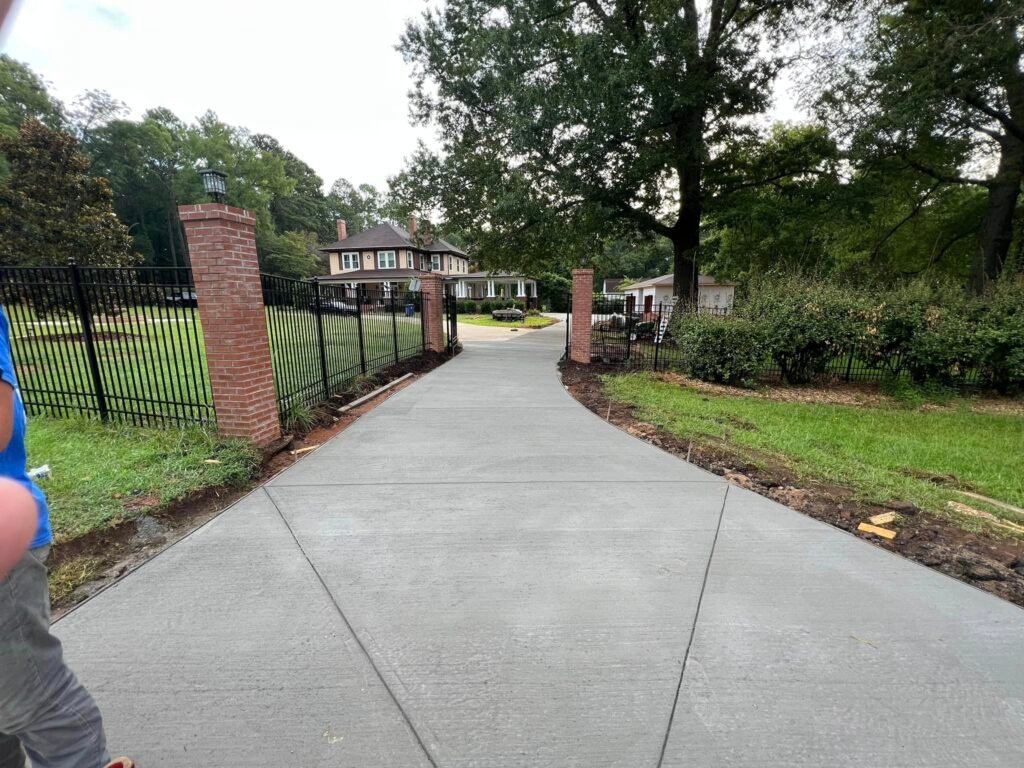When it comes to enhancing the exterior aesthetics of your home, the driveway often plays a pivotal role. It is the gateway to your home, setting the tone for what lies beyond. One of the critical decisions homeowners face is choosing the suitable material, and concrete often tops the list.
However, not all concrete is created equal. Many options are available, each with its unique blend of durability, maintenance requirements, and visual appeal. From the rugged charm of exposed aggregate to the sleek sophistication of polished concrete, the choices are as diverse as they are intriguing.
Join us as we explore these different types of concrete. We’ll delve into their distinctive attributes, weigh their pros and cons, and provide insights to help you make an informed decision. This comprehensive guide is your ultimate resource for comparing concrete types for driveways, ensuring your choice enhances your home’s curb appeal and stands the test of time.
“Which concrete type is best for driveways?”
When it comes to driveway construction, the type of concrete used plays a significant role in the durability and appearance of the finished product. Among the various types of concrete available, exposed aggregate concrete and stamped concrete are often the top choices for driveways.
Exposed aggregate concrete is renowned for its strength and durability. It can withstand heavy traffic and harsh weather conditions, making it an ideal driveway choice. Moreover, its unique aesthetic appeal, characterized by the exposed pebbles and stones, adds a touch of elegance to any property.
On the other hand, stamped concrete offers many design possibilities. It can mimic the appearance of bricks, stones, or even wood, providing homeowners with a stylish and customizable option. However, it may require more maintenance compared to exposed aggregate concrete.
Another popular choice is concrete pavers. This type of concrete is easy to install and replace if damaged, and it comes in various shapes and colors. However, they may shift over time, requiring occasional adjustment.
When deciding which concrete type is best for your driveway, consider factors such as durability, maintenance, cost, and aesthetic appeal. Each type has advantages and disadvantages, and the best choice ultimately depends on your specific needs and preferences.
The impact of weather on concrete driveway types is significant. For instance, freeze-thaw cycles can result in the deterioration of conventional concrete driveways. When water seeps into the concrete, it freezes and expands, causing it to crack and crumble. This is why driveway types like air-entrained concrete are preferred in colder climates. They contain tiny air pockets that allow for expansion and contraction, reducing the risk of damage from freeze-thaw cycles.
In contrast, concrete driveways can suffer from heat-related issues in hotter climates. The high temperatures can cause the concrete to expand and potentially crack. Therefore, driveway types like cool concrete are more suitable for these climates. They are designed to reflect more sunlight and absorb less heat, reducing the likelihood of heat-related damage.
Additionally, rain and humidity can also affect the durability of concrete driveways. Excessive moisture can lead to the growth of mold and mildew, which can cause the concrete to deteriorate.
Driveway types like permeable concrete are more resistant to these issues. They allow water to seep through, preventing moisture buildup and reducing the risk of mold and mildew growth.
In summary, the choice of concrete driveway type should consider the local weather conditions to ensure its durability and longevity.
“Can different concrete types affect driveway durability?”
The type of concrete used in driveway construction can significantly impact its durability. The main types of concrete used in driveway construction include standard concrete, reinforced concrete, and high-performance concrete.
Standard concrete, composed of cement, water, and aggregate, is a common choice due to its affordability and ease of installation. However, it may not offer the same longevity as other options, as it can be prone to cracking and surface scaling.
Conversely, reinforced concrete incorporates steel bars or mesh to improve strength and durability. This type of concrete is more resistant to heavy loads and adverse weather conditions, making it ideal for driveways that see a lot of use.
High-performance concrete is the third type to consider. It is designed to have enhanced properties and performance characteristics such as high strength and durability, extended workability, and improved aesthetics. This type of concrete is typically more expensive but can offer superior performance and longevity.
• Standard Concrete: Economical, easy to install, but more prone to damage.
• Reinforced Concrete: Durable, resistant to heavy loads, but more expensive.
• High-Performance Concrete: Enhanced properties and superior performance but higher cost.
It’s crucial to remember that the durability of a concrete driveway is also influenced by other factors, such as the quality of the installation, the climate, and the level of maintenance it receives. Therefore, choosing the right type of concrete is just the first step in ensuring a durable and long-lasting driveway.
Conclusion
In conclusion, the type of concrete used for driveways is pivotal for its durability and weather resistance. It’s essential to understand how different concrete types can affect the lifespan and performance of your driveway. Weather conditions, particularly extreme temperatures, can significantly impact the durability of concrete driveways.
Therefore, selecting the right concrete type that can withstand your local climate is crucial. Future trends in concrete technology may introduce new types and mixtures that offer enhanced durability and weather resistance. Stay updated with the latest trends and consult a professional when choosing the concrete type for your driveway.
